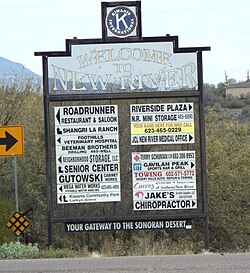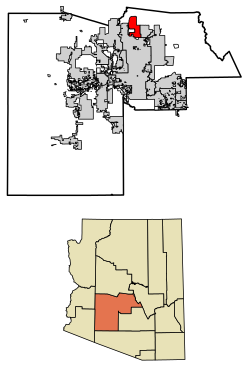Census-designated place in Arizona, United States
| New River, Arizona | |
|---|---|
| Census-designated place | |
 Welcome sign Welcome sign | |
 Location in Maricopa County and the state of Arizona Location in Maricopa County and the state of Arizona | |
  | |
| Coordinates: 33°52′09″N 112°05′09″W / 33.86917°N 112.08583°W / 33.86917; -112.08583 | |
| Country | United States |
| State | Arizona |
| County | Maricopa |
| Area | |
| • Total | 56.12 sq mi (145.35 km) |
| • Land | 56.11 sq mi (145.32 km) |
| • Water | 0.01 sq mi (0.03 km) |
| Elevation | 2,136 ft (651 m) |
| Population | |
| • Total | 17,290 |
| • Density | 308.16/sq mi (118.98/km) |
| Time zone | UTC-7 (MST) |
| ZIP codes | 85087 (New River) 85086 (Phoenix) |
| Area code | 623 |
| FIPS code | 04-49360 |
| GNIS feature ID | 2408920 |
New River is an unincorporated community and census-designated place (CDP) in Maricopa County, Arizona, United States. The population was 17,290 as of the 2020 census, up from 14,952 at the 2010 census.
History

New River is named after the seasonal wash of the same name, part of the Agua Fria River system which drains into the Salt River. The community was founded by Lord Darrell Duppa in 1868 as a stagecoach stop. For many years it was the terminus of the old Black Canyon Highway (now Interstate 17). The pavement ended in New River and continued as a dirt road to the city of Prescott.
Geography
New River is located in northern Maricopa County and is bordered by the Tonto National Forest to the north, Cave Creek to the east, Phoenix to the south, and Phoenix and Anthem to the west. The CDP includes the area known as Desert Hills. New River is approximately 36 miles (58 km) north of downtown Phoenix.
According to the United States Census Bureau, the CDP has a total area of 56.1 square miles (145 km), of which 0.01 square miles (0.03 km), or 0.02%, are water. 3,176-foot (968 m) Daisy Mountain and 2,980-foot (910 m) Gavilan Peak are within the community.
Demographics
| Census | Pop. | Note | %± |
|---|---|---|---|
| 2000 | 10,740 | — | |
| 2010 | 14,952 | 39.2% | |
| 2020 | 17,290 | 15.6% | |
| U.S. Decennial Census | |||
As of the census of 2000, there were 10,740 people, 3,921 households, and 3,066 families residing in the CDP. The population density was 151.6 inhabitants per square mile (58.5/km). There were 4,514 housing units at an average density of 63.7 per square mile (24.6/km). The racial makeup of the CDP was 95.9% White, 0.4% Black or African American, 0.6% Native American, 0.5% Asian, 0.1% Pacific Islander, 1.3% from other races, and 1.4% from two or more races. 4.9% of the population were Hispanic or Latino of any race.
There were 3,921 households, out of which 35.3% had children under the age of 18 living with them, 68.9% were married couples living together, 5.6% had a female householder with no husband present, and 21.8% were non-families. 15.3% of all households were made up of individuals, and 2.9% had someone living alone who was 65 years of age or older. The average household size was 2.73 and the average family size was 3.04.
In the CDP, the population was spread out, with 26.0% under the age of 18, 4.8% from 18 to 24, 33.2% from 25 to 44, 28.5% from 45 to 64, and 7.5% who were 65 years of age or older. The median age was 38 years. For every 100 females, there were 103.9 males. For every 100 females age 18 and over, there were 102.4 males.
The median income for a household in the CDP was $62,307, and the median income for a family was $68,604. Males had a median income of $46,361 versus $31,610 for females. The per capita income for the CDP was $25,932. About 3.6% of families and 5.7% of the population were below the poverty line, including 5.5% of those under age 18 and 3.1% of those age 65 or over.
As of the census of 2010 the population of the New River CDP area was 14,952. This is nearly a two thirds growth from the previous census. The total housing units nearly doubled from 3,921 in 2000 to 6,753 in 2010.
New River CDP area is within Maricopa County District 3. According to 2010 census numbers, the New River CDP consists of about 2% of Maricopa County District 3 and only 0.3% of Maricopa County.
Government
New River is served by Deer Valley Unified School District.
Fire and emergency service is provided through the Daisy Mountain Fire District.
Many residents previously relied on water delivered by state-licensed water haulers from fire hydrants located in Phoenix. As of August 2018, water is hauled from a filling station operated by Epcor.
Incorporation efforts
New River, and its neighbor Desert Hills, are unincorporated areas in Maricopa County which in 2019 was named the fastest-growing county in the United States for the third year running. While parts of Maricopa have had considerable development, New River has held off. New River has attempted to "incorporate" a number of times in its history, so as to control zoning regulations and development in the area.
- In 1979 the area tried to incorporate into a town, and while the necessary signatures were collected to move forward with incorporation, the Maricopa County Superior Court Judge vacated the election, finding that New River was too rural and did not meet the statutory requirements for incorporation. At this time, Phoenix was approximately 30 miles (48 km) away.
- In 1995, the area attempted again to incorporate. However, this time the region to incorporate would have included approximately 120 square miles (310 km). While a sufficient number of signatures was collected, the City of Phoenix declined to pass a resolution to approve New River's request to incorporate. In 1999 there was another short-lived movement to incorporate, which also failed.
- In 2017, residents formed a committee to look into the feasibility of incorporating New River and its neighbor Desert Hills. In April 2019, the campaign to incorporate New River and Desert Hills was aiming to collect the signatures of ten per cent of registered voters needed to force a ballot on the issue in November 2019. In June 2019, it was reported that the campaign had failed to win the necessary approval of the City of Phoenix to have a vote on the issue, and the campaign group was reported as saying: "It is unfortunate that we are unable to continue our efforts after this latest development." The incorporation effort was opposed by the Arizona State Land Department.
Local attractions

- Cave Creek Regional Park
- Lake Pleasant Regional Park
- Wranglers Roost Stagecoach Stop (Established 1890)
- Spur Cross Ranch
- Daisy Mountain Preserve
- New River Kiwanis Park
- Gavilan Peak – Named in the 1880s, when the U.S. Cavalry and the Apaches fought a battle in the area. The name means "sparrow hawk" in Spanish and "hawk" in Apache.
Historic structures in New River
Further information: List of historic properties in New River, ArizonaPictured are some of the few remaining historic structures of New River.
Historic structures of New River, Arizona-
 Front gate of the historic Wranglers Roost Stagecoach Stop
Front gate of the historic Wranglers Roost Stagecoach Stop
-
 The Station
The Station
-
The Jack Ass Acres Service Station, which has since been demolished and replaced by a nearby Shell station
See also
References
- ^ "2021 U.S. Gazetteer Files: Arizona". United States Census Bureau. Retrieved May 17, 2022.
- ^ U.S. Geological Survey Geographic Names Information System: New River, Arizona
- ^ "New River CDP, Arizona: 2020 DEC Redistricting Data (PL 94-171)". U.S. Census Bureau. Retrieved May 17, 2022.
- "Census 2010: Arizona". usatoday.com. Retrieved April 22, 2018.
- "New River, Arizona History and Trivia". www.hometownusa.com. Retrieved April 22, 2018.
- "U.S. Decennial Census". Census.gov. Retrieved May 10, 2014.
- "U.S. Census website". United States Census Bureau. United States Census Bureau. Retrieved November 24, 2018.
- "U.S. Census Bureau QuickFacts: Maricopa County, Arizona". Census Bureau QuickFacts. Retrieved November 24, 2018.
- "daisymountainfire.org". daisymountainfire.
- "New River & Desert Hills Water Filling Station". www.epcor.com.
- "New River to get new water supply | Cronkite News". May 29, 2018.
- ^ Jessica Boehm (May 1, 2019). "New River residents feud over whether to become a city". The Arizona Republic.
Supporters of the New River Desert Hills incorporation are hoping to get the question on the ballot in November. The last town to incorporate in Arizona was Tusayan in 2010, according to Ken Strobeck, executive director of the Arizona League of Cities and Towns. In order to get incorporation on the ballot, incorporation supporters must collect signatures from at least 10 percent of registered voters in the proposed city limits.
- ^ "NRDHIC – Archives". nrdhic.org. Retrieved November 24, 2018.
- "NRDHIC". nrdhic.org. Retrieved November 24, 2018.
- "NRDHIC". www.savenewriver.com. Retrieved November 24, 2018.
- "NRDHIC Press". www.nrdhic.org. Retrieved November 24, 2018.
- Ali Vetnar (April 9, 2019). "Some residents want North Valley community to become its own town". KTAR-FM.
The group also needs to collect signatures from 10% of registered voters in the area to put the measure on the November ballot. Ricci said this effort has been going on for three decades, but they've never been able to bring issue to a vote.
- Robert Roy Britt (June 3, 2019). "Plan to Incorporate New River & Desert Hills Dies". North Phoenix News. Retrieved June 5, 2019.
- "Incorporation efforts halt – The Foothills Focus".
- "ASLD entire letter.PNG". Archived from the original on August 3, 2019.
- "Gavilan Peak, AZ". HikeArizona.com. Retrieved August 16, 2016.
- www.nerdmecca.com. "Jack Ass Acres, Arizona – Ghost Towns of Arizona and Surrounding States". www.ghosttownaz.info. Retrieved April 22, 2018.
External links
| Municipalities and communities of Maricopa County, Arizona, United States | ||
|---|---|---|
| County seat: Phoenix | ||
| Cities |  | |
| Towns | ||
| CDPs | ||
| Populated places |
| |
| Indian reservations | ||
| Ghost towns/ former populated places | ||
| Footnotes | ‡This populated place also has portions in an adjacent county or counties | |
| Phoenix metropolitan area | |
|---|---|
| Core city | |
| Largest suburbs (over 100,000 inhabitants) | |
| Other suburbs and towns (over 10,000 inhabitants) | |
| Smaller suburbs and towns (over 5,000 inhabitants) | |
| Exurbs | |
| Counties | |
| Native American reservations | |
| Subregions | |